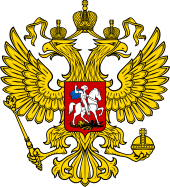| 2022 war censorship laws | |
|---|---|
 | |
| Federal Assembly | |
| |
| Territorial extent | Russia |
| Signed by | President Vladimir Putin |
| Signed | 4 March 2022 |
| Commenced | 4 March 2022 |
| Legislative history | |
| First reading | 4 March 2022 (State Duma) |
| Second reading | 4 March 2022 (Federation Council) |
| Amends | |
| Status: Current legislation | |
On Amendments to the Criminal Code of the Russian Federation and Articles 31 and 151 of the Criminal Procedure Code of the Russian Federation is a group of federal laws promulgated by the Russian government during the Russian invasion of Ukraine. These laws establish administrative and criminal punishments for "discrediting" or dissemination of "unreliable information" about the Russian Armed Forces, other Russian state bodies and their operations, and the activity of volunteers aiding the Russian Armed Forces, and for calls to impose sanctions against Russia, Russian organizations and citizens.[1][2] These laws are an extension of Russian fake news laws and are sometimes referred to as the fakes laws.
The laws have been strongly condemned by the political opposition and by human rights groups. The adoption of these laws resulted in the mass exodus of foreign media from Russia and the termination of war reporting by independent Russian media. More than 4,000 people have been prosecuted under these laws,[3] though the laws have been applied inconsistently, with ultra-nationalists and pro-war activists avoiding prosecution despite publishing critical material.
Initially, when enacted on 4 March 2022, the laws applied only to discrediting or disseminating unreliable information about the Russian Armed Forces. The scope of the law has expanded twice: on 25 March when punishments were added for discrediting Russian state bodies or disseminating unreliable information about the exercise of their powers outside Russian territory, and on 18 March 2023 when punishments were added for discrediting or disseminating unreliable information regarding volunteer groups aiding the Russian Armed Forces.
- ^ Galayda, Ekaterina. "Срок за невнимательность: Чем опасен для СМИ новый закон о фейках". Национальная Служба Новостей - НСН (in Russian). Retrieved 14 March 2022.
- ^ "Держдума ухвалила закон 'про фейки': в РФ саджатимуть за правду про війну". Ukrayinska Pravda (in Ukrainian). Archived from the original on 14 March 2022. Retrieved 14 March 2022.
- ^ Cite error: The named reference
csmonitor-fredwas invoked but never defined (see the help page).